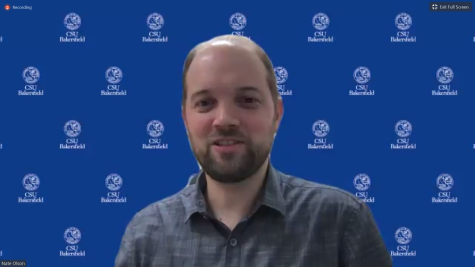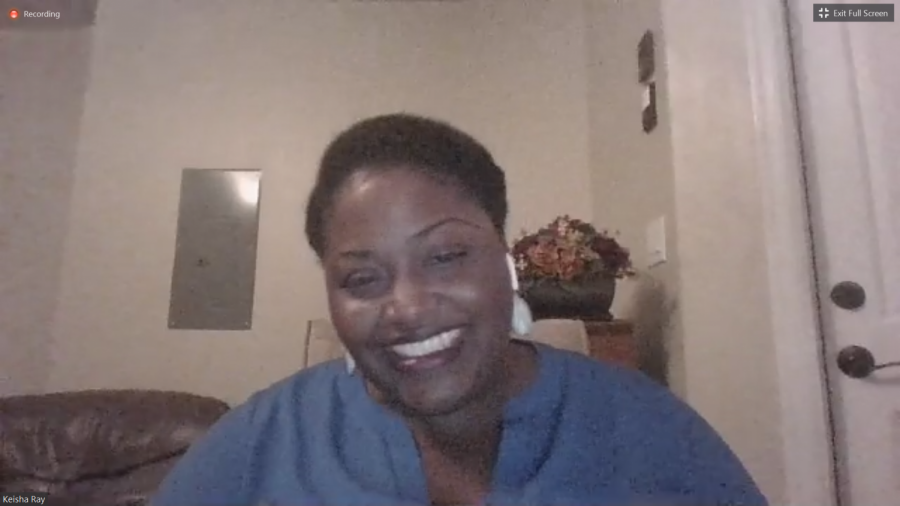Experts talk pandemic ethics at “Ethics and COVID-19: A Moderated Conversation”
Assistant professor Dr. Keisha Ray, PhD, from the McGovern Medical School speaks about hospital ethics on Sept. 10.
September 21, 2020
To kick off the Bioethics and Medical Humanities Speakers series hosted by The Kegley Institute of Ethics (KIE) in partnership with Kaiser Permanente, the organizations collaborated to host a digital informational event on Sept. 10.
The event was hosted to help local residents understand and discuss ethical issues in the medical field.
The main focus of the event was the relationship between ethics and COVID-19. Nate Olson, the associate director of KIE, hosted the event with the help of other experts on the panel.
Ultimately, Olson and the panel agreed the most ethical thing the community can do is to make choices that reflect factual information. This steered the conversation toward questions about society’s values and ethics, as well as the responsibilities that everyone has during these challenging times because of COVID-19.
The panel agreed that the community’s responsibilities fall within how well everyone follows the safety guidelines set in place. This includes wearing a mask, frequent hand washing, social distancing, and regularly disinfecting surfaces and objects that are touched often.

Keisha Ray, assistant professor at the McGovern Medical School at the University of Texas, referred to the pandemic as an opportunity to further evaluate the struggles faced by minority community members at this time. Ray brought to light the issues of inequities faced by minorities impacted by COVID-19.
“COVID-19 was able to thrive because social inequities created this sort of perfect storm. COVID-19 magnified these inequities and created more inequities,” Ray said.
Ray said these inequities include limited access to transportation, reduced access to quality education, and limited access to safe housing, each serving as an indicator of an individual’s overall health.
This prompted discussion about the concerns many families have expressed during the pandemic, as panelists considered the dilemmas faced by families due to the loss of income, virtual learning, and the correct choices on how to keep their families safe and healthy.
Dr. Nimisha Amin, pediatrician and pediatric nephrologist for Southwest Pediatrics, also stressed her view that physical and mental health are what will get us through the upcoming months.
Dr. Amin suggested it is okay for people to emerge from their homes and find safe activities to do with their families with the right precautions in place such as proper social distancing, wearing a mask and washing your hands daily.
Just as COVID-19 poses a risk to an individual’s well-being, being stuck at home and living in fear can be detrimental to physical and mental health as well, according to Dr. Amin. This risk then forces individuals to find a way to balance both their physical and mental health during the pandemic.
Christopher Meyers, a hospital ethicist from Kern Medical and Adventist Health Bakersfield, supported the concept of a socially distanced active community. He discussed how this can be possible, if the community practices social distancing in combination with other everyday preventative actions.
To Meyers, the most ethical principle is to “try not to harm other folks” at all.

This can be seen through the changes made to education delivery methods, serving as just one example of how the community can help protect one another. While there may be a reduction in the quality of education being offered, Meyers expressed he believed it is the best option during the pandemic.
Another example includes how COVID-19 comes with an economic risk as consumers are urged to avoid busy locations; Meyers expressed his belief that it will worsen.
He encouraged everyone to support small local businesses if they can, noting that the country is already entering a recession, ultimately supporting Dr. Amin’s recommendation to be cautious but to still live life.
“Trying our best to both not harm people and do what we can to help people,” Meyers stated are the most important ethical values someone can have.
The most common message of the night was for community members to remember to be kind to one another.
“We are in a pandemic; the rules are a little bit different,” Ray said.






